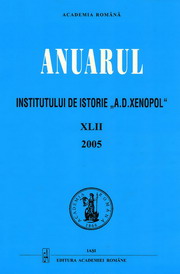ISTORIOGRAFIA ROMÂNEASCĂ A MARELUI RĂZBOI (1944-2014). CONTINUITATE ŞI INOVAŢIE
ROMANIAN HISTORIOGRAPHY OF THE GREAT WAR (1944-2014). CONTINUITY AND INNOVATION
Author(s): Oana Mihaela TămasSubject(s): History
Published by: Editura Academiei Române
Keywords: World War I; historiography; communist period;political influence;
Summary/Abstract: 100 years after the start of the conflict, we do not know yet, not even with a degree of approximation, which were the favourite topics of the historians, in the communist period, how they wrote and what positions they took in relationship to the existing political climate. In this study, we plan to carry out an analysis of the historiographical production concerning World War I, and we will investigate the manner in which the political climate influenced the historical writing on the topic, on the basis of a wide quantitative and qualitative analysis of the historical writing. Moving on to the inventorying of the Romanian historical historiographical research, during the communist regime, we notice that their debut occurs in a rather beneficial historio-graphical context, determined by the new options of the political regime, which attempted a theoretical resizing of its basis and structures. This was a time when the year 1918 and everything it meant in the history of modern Romania was, for the first time, taken out “from the closet”. At the beginning of the 60s, a certain expansion of the field of history of historiography was noticeable, both in the country and especially abroad, an expansion materialized a few years later, after a series of preliminary explorations, with the setting up of a Commission for the History of Historiography at the International History Congress which took place in Bucharest in 1980. This period noticed an unchaining of the topic 1918 from the chains of the ideological taboo; in 1968, for the first time after 1948, they celebrated with pomp, half a century from the great event. A new stage in the history of Romanian historiography is recorded after 1971, with some of the worst consequences for historical research, consequences that consisted in the unnatural emphasis of the national feeling for serving the interest of the leader, given that this idea became almost the only propagandistic reserve for the head of state. We have noticed that there is no qualitative nor quantitative analysis of the historiography of World War I. However, there is no critical analysis of this historiographical production which could facilitate the contemporary historian’s access to a published source. Thus it is needed to reconsider critically and to evaluate the qualitative and quantitative contribution produced by the Romanian historiography on this topic. Such an endeavour is needed with a view of separating the valid contributions, useful even today for researching World War I, from the flawed texts that have been instrumentalised and compromised as an effect of the ideological and propagandistic pressure of the communist period.
Journal: Anuarul Institutului de Istorie »A.D. Xenopol« - Iaşi
- Issue Year: LI/2014
- Issue No: Supl. 1
- Page Range: 331-341
- Page Count: 11
- Language: Romanian

